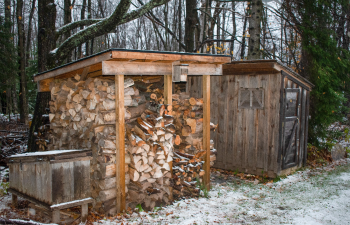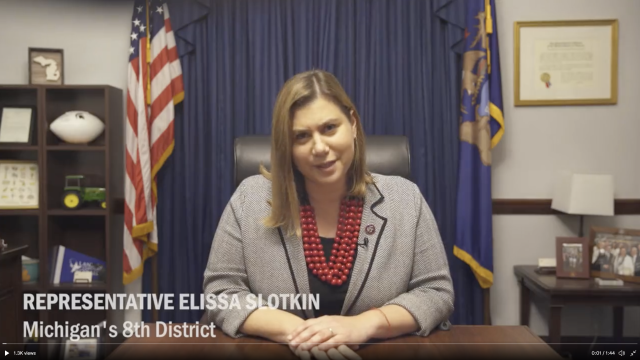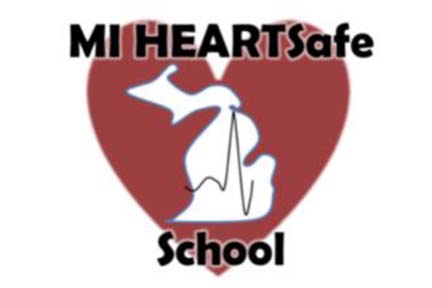| This week’s stories may reflect how the Department of Natural Resources has adapted to meet customer needs and protect public health and safety. Follow our COVID-19 response page for updates on access to facilities and programs.
We’ll continue to share news and information about the best ways to discover and enjoy Michigan’s natural and heritage resources! Here’s a look at some of this week’s stories:
See other news releases, Showcasing the DNR stories, photos and other resources at Michigan.gov/DNRPressRoom.
PHOTO FOLDER: Larger, higher-res versions of the images used below, and others, are available in this folder.
 Want to see more pictures like this, taken by Michigan state parks photo ambassador Ken Jacobsen at Interlochen State Park in Grand Traverse County? Visit Instagram.com/MiStateParks to explore photos and learn more about the photo ambassadors! For more on the photo ambassador program, call Stephanie Yancer at 989-274-6182. Want to see more pictures like this, taken by Michigan state parks photo ambassador Ken Jacobsen at Interlochen State Park in Grand Traverse County? Visit Instagram.com/MiStateParks to explore photos and learn more about the photo ambassadors! For more on the photo ambassador program, call Stephanie Yancer at 989-274-6182.
 Bat Week, the international celebration of bats, takes place this year Oct. 24-31 and is the perfect time to shine a light on these important species. Bat Week, the international celebration of bats, takes place this year Oct. 24-31 and is the perfect time to shine a light on these important species.
Michigan is home to nine species of bats, all of which are insectivores. During the evening hours, these flying mammals consume many insect pests including mosquitoes, beetles, moths and flies.
The DNR, along with numerous partners, works to conserve bats and bat habitat because many species are in decline.
White-nose syndrome is a deadly disease that affects North American bats primarily during their winter hibernation and has devastated many bat species. Infected bats prematurely awaken from hibernation, rapidly deplete their fat reserves and are unable to survive the winter. Bats with this syndrome often exhibit unusual behavior, like flying during daylight hours or gathering outside of caves in cold weather.
Learn about our efforts to conserve Michigan’s bats in our Wildlife Conservation Month story.
Here’s how you can help bats:
- Plant a bat-friendly garden and minimize the use of insecticides.
- Remove invasive species.
- Install a bat house in a location not frequented by people.
- Do not enter closed mines and follow decontamination guidelines to help reduce the spread of white-nose syndrome.
Learn more about bats and ways you can take action during Bat Week – and all year long – at BatWeek.org.
More information on Michigan’s bat species and ways to help is available at Michigan.gov/Bats.
Questions? Contact the DNR Wildlife Division at 517-284-9453. |
 It’s hard to imagine tiny Chinook salmon eggs will one day become the mighty, fighting fish that swim Michigan waters, but it’s a natural wonder that plays out year after year in the DNR’s Salmon in the Classroom program. Though the program raises and releases a relatively small number of fish, it does something just as important – it builds students’ respect and understanding of this very cool species. It’s hard to imagine tiny Chinook salmon eggs will one day become the mighty, fighting fish that swim Michigan waters, but it’s a natural wonder that plays out year after year in the DNR’s Salmon in the Classroom program. Though the program raises and releases a relatively small number of fish, it does something just as important – it builds students’ respect and understanding of this very cool species.
Eggs for the SIC program were collected in early October. By mid-November they’ll become “eyed eggs,” meaning that you can actually see the fish eyes as they develop on each egg. At this point, the hardy eggs will be ready for teachers to pick up and transport back to classroom fish tanks. Some 300 teachers (third through 12th grades) and more than 30,000 students are participating this year.
DNR aquatic education coordinator Tracy Page said each classroom will mark the same milestones:
- By early December, eggs will hatch into “sac fry” and live off their yolk sacs for a few weeks. By winter break, they should have absorbed their yolk sacs and begun feeding on provided food pellets.
- Through winter and early spring, classes observe and feed the fish, test water quality and maintain the tanks. Teachers will use over 30 DNR-provided classroom activities to help students learn about Great Lakes ecology, invasive species, history and even art.
- Schools begin releasing fish into approved waterways around the state by mid-April. Release days usually involve fun field trips, with education stations on casting/fishing, macroinvertebrate sampling (fish food), fish identification and other topics. Many community partners get involved, too, offering great experiences for the kids. All fish are released by
June 1.
“This popular program is a highly interactive experience for teachers and students, who are involved in every aspect of raising the salmon and responsible for their survival and release,” Page said. “The kids are getting hands-on learning about science and seeing firsthand that they can make a positive difference on our natural world.”
Everyone can learn more about Salmon in the Classroom through a series of more than 50 videos that cover everything from full-class presentations on the history and life cycle of salmon, to brief looks at time-lapse hatching, water testing and fish tagging.
Classroom teachers interested in applying can do so between Jan. 1 and
April 15 each year.
Questions? Contact Tracy Page at 989-277-0630 or visit Michigan.gov/SIC. |
 As more hunters get into the woods for Michigan’s deer seasons, it’s important that everyone understands current regulations on baiting and feeding. Since Jan. 31, 2019, no baiting or feeding is allowed in the entire Lower Peninsula, a regulation approved by the Michigan Natural Resources Commission. As more hunters get into the woods for Michigan’s deer seasons, it’s important that everyone understands current regulations on baiting and feeding. Since Jan. 31, 2019, no baiting or feeding is allowed in the entire Lower Peninsula, a regulation approved by the Michigan Natural Resources Commission.
Deer and elk baiting and feeding also are prohibited in the core chronic wasting disease surveillance area in the Upper Peninsula, an area that includes portions of Delta, Dickinson and Menominee counties surrounding the farm where a deer tested positive for the deadly wildlife disease in October 2018.
“Most wildlife researchers and biologists agree that anything that congregates animals will increase the likelihood of transmitting diseases, including chronic wasting disease,” said Holly Vaughn, manager of the DNR Wildlife Division’s Public Outreach and Engagement Unit. “Left unchecked, CWD will further harm deer populations in Michigan and across the country, and that’s why it’s critical all hunters have the facts about baiting and feeding.”
Regulation highlights say that:
- Baiting is allowed in all areas of the Upper Peninsula outside of the core CWD surveillance area.
- The ban applies to both public and private land.
- Feeding of birds and other wildlife for nonhunting purposes is allowed in areas where baiting and feeding are banned, as long as it is done in a way that keeps deer and elk from reaching the feed.
Get more details on baiting and feeding regulations at Michigan.gov/CWD.
Questions? Contact the DNR Wildlife Division at 517-284-9453. |
 Temperatures are falling like leaves, and people across the state are stocking up on wood and firing up woodstoves and fireplaces. As cozy as fires can be, it’s important to keep safety in mind. Safe, efficient burning includes taking care of your firewood and your burning equipment. Temperatures are falling like leaves, and people across the state are stocking up on wood and firing up woodstoves and fireplaces. As cozy as fires can be, it’s important to keep safety in mind. Safe, efficient burning includes taking care of your firewood and your burning equipment.
Check out these resources from the EPA Burn Wise Program to learn more or order paper copies:
Find many more tips for burning wood at EPA.gov/BurnWise. |
 Since the start of the COVID-19 pandemic, Michigan residents have headed outdoors in record numbers, seeking space to spread out, exercise and relieve stress. Hunting and fishing, camping and several other outdoor recreation activities saw significant user increases last year and into 2021. Since the start of the COVID-19 pandemic, Michigan residents have headed outdoors in record numbers, seeking space to spread out, exercise and relieve stress. Hunting and fishing, camping and several other outdoor recreation activities saw significant user increases last year and into 2021.
Understandably, many people also have turned to technology to make everyday activities like grocery shopping, banking and paying bills more efficient, less time-consuming and, perhaps most importantly, removed from traditional face-to-face contact in order to limit spread of the virus. DNR customers are part of that trend, too, going online to do things like purchase licenses, make campground reservations, find recreation safety classes, research park amenities and explore natural and historic sites.
The convenience is appealing, but when people take their buying and research efforts online – especially via mobile devices like smartphones and tablets, and local Wi-Fi – there are real-world security risks to consider. According to a recent RSA Fraud Quarterly Report, more than 40% of fraud occurs in mobile applications, and mobile security company Zimperium said that malware grew 118% between just the third and fourth quarters of 2020.
With the goal of helping residents stay safe on mobile devices, the State of Michigan created the Michigan Secure app, launched earlier this year. It’s free to download and free to use, with no in-app purchases or advertisements, and alerts you to unsafe apps in Android, system tampering and other suspicious activity, including:
- Potentially unsafe email attachments and downloaded apps.
- Phishing attempts to trick you into sharing personal information.
- Unsecure Wi-Fi networks.
One of StateScoop’s IT Innovations of the Year, Michigan Secure is unlike other mobile security apps in that it does not collect any of your personal, private information.
Don’t get hooked by phishing scams and other mobile threats! Learn more about how Michigan Secure can keep you and your family safer online at Michigan.gov/MichiganSecureApp.
Media inquiries? Contact Michigan Cyber Security at DTMB-Michigan-Secure-App@Michigan.gov. |
|







 Want to see more pictures like this, taken by Michigan state parks photo ambassador
Want to see more pictures like this, taken by Michigan state parks photo ambassador  Bat Week, the international celebration of bats, takes place this year Oct. 24-31 and is the perfect time to shine a light on these important species.
Bat Week, the international celebration of bats, takes place this year Oct. 24-31 and is the perfect time to shine a light on these important species.
 It’s hard to imagine tiny Chinook salmon eggs will one day become the mighty, fighting fish that swim Michigan waters, but it’s a natural wonder that plays out year after year in the DNR’s Salmon in the Classroom program. Though the program raises and releases a relatively small number of fish, it does something just as important – it builds students’ respect and understanding of this very cool species.
It’s hard to imagine tiny Chinook salmon eggs will one day become the mighty, fighting fish that swim Michigan waters, but it’s a natural wonder that plays out year after year in the DNR’s Salmon in the Classroom program. Though the program raises and releases a relatively small number of fish, it does something just as important – it builds students’ respect and understanding of this very cool species.
 As more hunters get into the woods for Michigan’s deer seasons, it’s important that everyone understands current regulations on baiting and feeding. Since Jan. 31, 2019, no baiting or feeding is allowed in the entire Lower Peninsula, a regulation approved by the Michigan Natural Resources Commission.
As more hunters get into the woods for Michigan’s deer seasons, it’s important that everyone understands current regulations on baiting and feeding. Since Jan. 31, 2019, no baiting or feeding is allowed in the entire Lower Peninsula, a regulation approved by the Michigan Natural Resources Commission.
 Temperatures are falling like leaves, and people across the state are stocking up on wood and firing up woodstoves and fireplaces. As cozy as fires can be, it’s important to keep safety in mind. Safe, efficient burning includes taking care of your firewood and your burning equipment.
Temperatures are falling like leaves, and people across the state are stocking up on wood and firing up woodstoves and fireplaces. As cozy as fires can be, it’s important to keep safety in mind. Safe, efficient burning includes taking care of your firewood and your burning equipment.
 Since the start of the COVID-19 pandemic, Michigan residents have headed outdoors in record numbers, seeking space to spread out, exercise and relieve stress. Hunting and fishing, camping and several other outdoor recreation activities saw significant user increases last year and into 2021.
Since the start of the COVID-19 pandemic, Michigan residents have headed outdoors in record numbers, seeking space to spread out, exercise and relieve stress. Hunting and fishing, camping and several other outdoor recreation activities saw significant user increases last year and into 2021.




